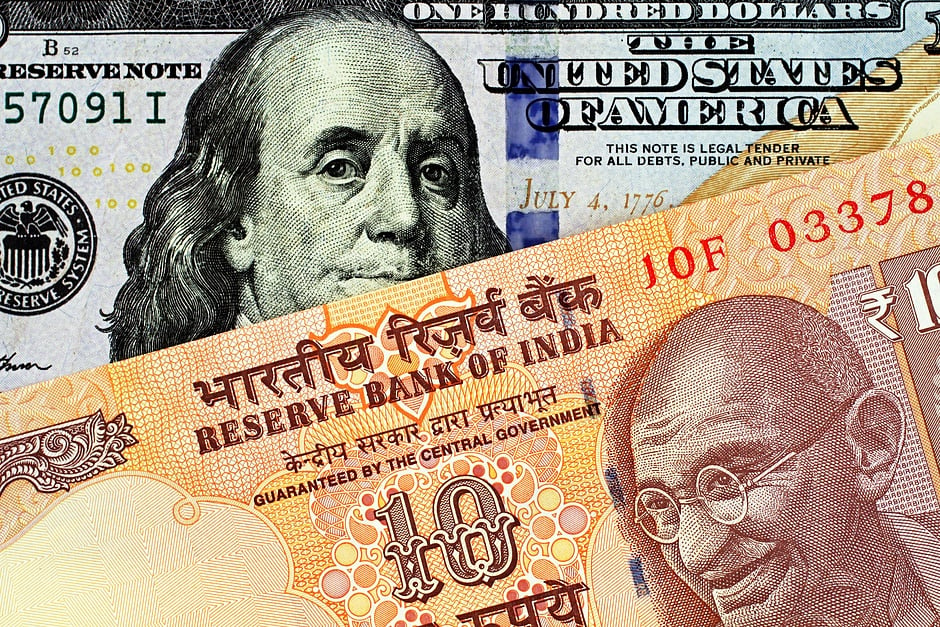Created
: 2024.11.21













![]() 2024.11.21 11:54
2024.11.21 11:54
The Indian Rupee (INR) extends its decline on Thursday. The heightened geopolitical tensions and market reactions due to Donald Trump's victory in the US presidential elections drag the local currency lower. Additionally, continuous foreign portfolio outflows might continue to undermine the INR in the near term.
Nonetheless, the Reserve Bank of India (RBI) is likely to intervene in the foreign exchange to mitigate further depreciation of the local currency, with state-run banks offering USD in the market. Later on Thursday, traders will monitor the US weekly Initial Jobless Claims, the Philadelphia Fed Manufacturing Index, Existing Home Sales, and the CB Leading Index, which are due later on Thursday. Also, the Federal Reserve's (Fed) Beth Hammack and Austan Goolsbee are scheduled to speak.
The Indian Rupee softens on the day. The USD/INR pair keeps the bullish vibe as the price holds above the ascending channel throwback support on the daily time frame. The 14-day Relative Strength Index (RSI) is located above the midline around 66.70, suggesting that the further upside looks favorable.
The all-time high of 84.45 appears to be a tough nut to crack for the bulls. A decisive break above this level could still take the pair up to the 85.00 psychological level.
On the other hand, sustained bearish momentum below the resistance-turned-support level at 84.35 could pave the way to the 84.00-83.90 zone, representing the round mark and the 100-day EMA.
The Indian Rupee (INR) is one of the most sensitive currencies to external factors. The price of Crude Oil (the country is highly dependent on imported Oil), the value of the US Dollar - most trade is conducted in USD - and the level of foreign investment, are all influential. Direct intervention by the Reserve Bank of India (RBI) in FX markets to keep the exchange rate stable, as well as the level of interest rates set by the RBI, are further major influencing factors on the Rupee.
The Reserve Bank of India (RBI) actively intervenes in forex markets to maintain a stable exchange rate, to help facilitate trade. In addition, the RBI tries to maintain the inflation rate at its 4% target by adjusting interest rates. Higher interest rates usually strengthen the Rupee. This is due to the role of the 'carry trade' in which investors borrow in countries with lower interest rates so as to place their money in countries' offering relatively higher interest rates and profit from the difference.
Macroeconomic factors that influence the value of the Rupee include inflation, interest rates, the economic growth rate (GDP), the balance of trade, and inflows from foreign investment. A higher growth rate can lead to more overseas investment, pushing up demand for the Rupee. A less negative balance of trade will eventually lead to a stronger Rupee. Higher interest rates, especially real rates (interest rates less inflation) are also positive for the Rupee. A risk-on environment can lead to greater inflows of Foreign Direct and Indirect Investment (FDI and FII), which also benefit the Rupee.
Higher inflation, particularly, if it is comparatively higher than India's peers, is generally negative for the currency as it reflects devaluation through oversupply. Inflation also increases the cost of exports, leading to more Rupees being sold to purchase foreign imports, which is Rupee-negative. At the same time, higher inflation usually leads to the Reserve Bank of India (RBI) raising interest rates and this can be positive for the Rupee, due to increased demand from international investors. The opposite effect is true of lower inflation.
![]()
Created
: 2024.11.21
![]()
Last updated
: 2024.11.21

FXStreet is a forex information website, delivering market analysis and news articles 24/7.
It features a number of articles contributed by well-known analysts, in addition to the ones by its editorial team.
Founded in 2000 by Francesc Riverola, a Spanish economist, it has grown to become a world-renowned information website.
We hope you find this article useful. Any comments or suggestions will be greatly appreciated.
We are also looking for writers with extensive experience in forex and crypto to join us.
please contact us at [email protected].
Disclaimer:
All information and content provided on this website is provided for informational purposes only and is not intended to solicit any investment. Although all efforts are made in order to ensure that the information is correct, no guarantee is provided for the accuracy of any content on this website. Any decision made shall be the responsibility of the investor and Myforex does not take any responsibility whatsoever regarding the use of any information provided herein.
The content provided on this website belongs to Myforex and, where stated, the relevant licensors. All rights are reserved by Myforex and the relevant licensors, and no content of this website, whether in full or in part, shall be copied or displayed elsewhere without the explicit written permission of the relevant copyright holder. If you wish to use any part of the content provided on this website, please ensure that you contact Myforex.
Myforex uses cookies to improve the convenience and functionality of this website. This website may include cookies not only by us but also by third parties (advertisers, log analysts, etc.) for the purpose of tracking the activities of users. Cookie policy